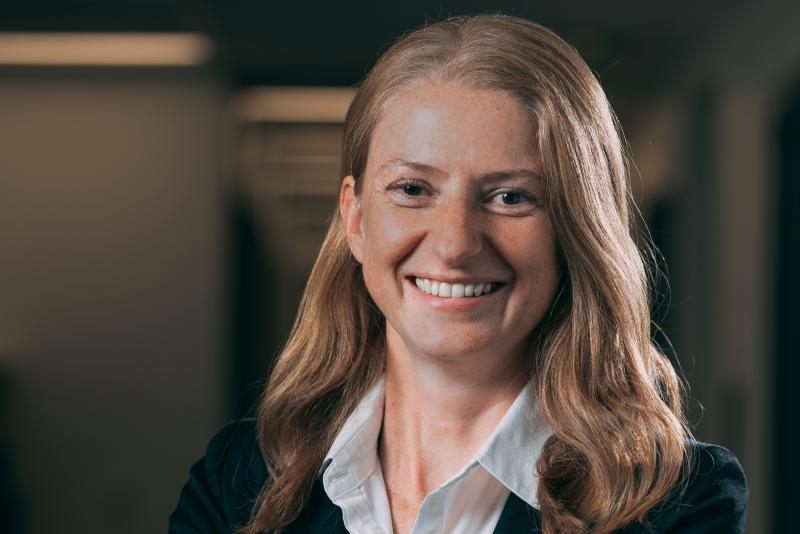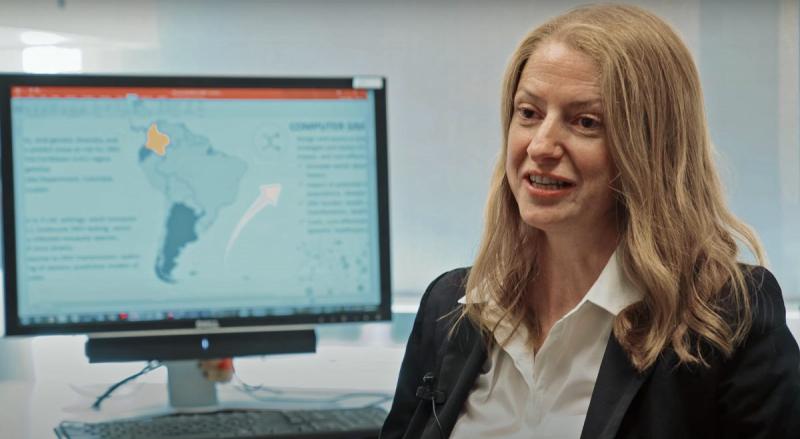December 13, 2021 | Campaign
The Friday the 13th that led U of T grad Beate Sander to build COVID-19 models for Ontario

When the pandemic hit in March 2020, U of T graduate and scientist Beate Sander and her team of graduate students found themselves leading efforts to predict the path of the virus in Ontario and how it would affect hospitals and Canadians’ health and well-being.
You graduated from U of T in 2011. Can you tell us where you are today?
I’m a scientist at University Health Network and I teach at the Institute of Health Policy, Management and Evaluation at the Dalla Lana School of Public Health. I’m also the Canada Research Chair of the Economics of Infectious Diseases.
Your volunteer involvement with U of T has focused on the province’s efforts to understand and fight COVID—take us back to the beginning.
In my work, I use health administrative data and simulation models to understand the impact of infectious diseases on health outcomes, costs, and more. It was Friday the 13th of March 2020 when I was in my office with my graduate students looking at what was coming out of Italy and the terrible strain on their health-care systems. We thought, hmm, what if that happens in Ontario, what would this look like? We got to work right away, and by Monday or Tuesday had our first model. From that day, I have been working pretty much non-stop helping to develop models for the province – trying to figure out how COVID patients would move through our health-care system, analyzing our system capacity, understanding personal protective equipment (PPE) supplies and medications used in the ICU, predicting case counts – the whole lot.
U of T has the capacity to make an impact and help our population.
This was a team effort with some of your graduate students. Tell us a bit about that.
That Friday the 13th there were four of us in my office taking a look at the potential modelling for Ontario. I had been a nurse so I had a particular interest in what was going on in ICUs in Europe and then it just expanded. One of my students had just returned from Thailand due to COVID shutting down travel. Well let’s just say that his jet lag worked to our advantage – he couldn’t sleep so he spent his days programming, and then switched with the other postdocs on the team. Together, they produced the models that ultimately aided the province –and the country—to understand what we were facing. We stopped everything and worked 24/7 in those early weeks and months.

What have you learned, in terms of staying involved with U of T in this way?
This was a unique situation, of course, but it really does follow the spirit of any volunteering. U of T gives you a tremendous platform on which to really make a difference, and it is where you find the very best people to work with towards a common cause or need. There aren’t a lot of people doing this kind of sophisticated modelling, for example, with the drive and passion to drop everything to give their energy, time, and knowledge to some of the most complex issues facing our world–like the pandemic. I was thrilled to be able to do this at U of T, because we have the capacity to make an impact and help our population.
One of U of T’s campaign themes is “Enabling Healthy Lives.” What does that term mean to you?
I have spent my career embracing the quest for healthy populations. Beginning with my work as an ICU nurse, and then to understanding infectious diseases and their effects on our health systems. I believe we can take an economic lens on health care and that will make a huge difference to the health of populations all over the world. One needs to look no further than what we’ve been doing for the past 18 months and how quickly we’ve been able to mobilize science, to predict possible COVID-19 trajectories and inform policy, or to develop and distribute vaccines, to understand the sophisticated work that U of T and its health-care partners do in ensuring healthy lives.
U of T gives you a tremendous platform on which to really make a difference, and it is where you find the very best people to work with towards a common cause or need.
Where do you keep your U of T degree?
To be honest, it’s in the closet that I’m looking at right now from my home desk.
What would you tell your first-year self?
I would say soak up everything you can to figure out what you love. Take a broad range of courses; sample a lot of different areas, just like a buffet. I think that approach helps develop one’s interests in a more meaningful way, as opposed to jumping into something very specific without looking left and right. The other thing is, and I tell my graduate students this, is to embrace teamwork. There’s a whole team around the work you do, and it’s easy to find your community even if you don’t feel it right away.
At U of T you can find your community even if you don’t feel it right away…
What words do you live by?
Life can be serious, and we may not all always be able to find a way to have fun while you’re dealing with the serious things, but find it!
Defy Gravity: The Campaign for the University of Toronto aims to achieve one million volunteer engagements by our graduates. These engagements range from mentoring, event attendance, and countless opportunities to give the gift of time to help U of T, our students, and our alumni community.
Join your fellow alumni by sharing your time and expertise with the University.
Get InvolvedExplore campaign initiatives related to driving scientific discovery or enabling healthy lives

